30 Foods Under 40 Calories, with Recipes
View as one page
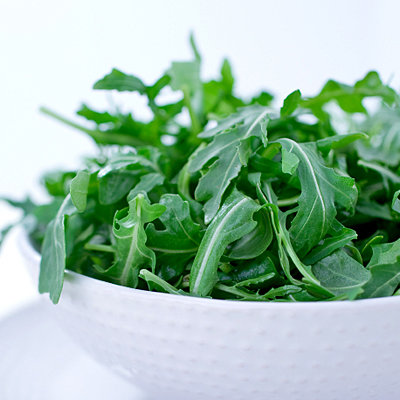
Arugula
Calories: 4 per cup
This delicate, peppery green is amazingly low in everything you don’t want, especially calories, fat, saturated fat, and cholesterol. It is, however, loaded with crunch and packed with fiber, vitamins A, C and K, and other nutrients, including potassium.
Perfect in salads, soups, or anywhere you would use leafy greens, arugula may even boost your romantic life! Evidence suggests that the minerals and antioxidants packed into dark, leafy greens are essential for our sexual health because they help block absorption of toxins that dampen the libido.
Try this recipe: Arugula Soup
View as one page
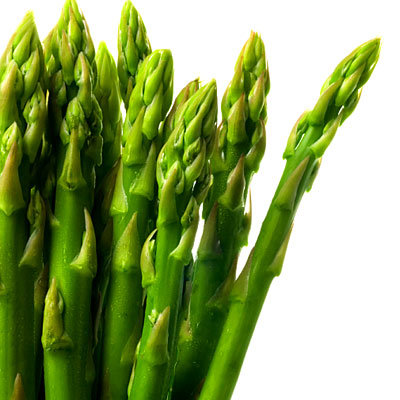
Asparagus
Calories: 27 per cup
Asparagus is traditionally known as a detoxifying food, because it contains high levels of an amino acid that acts as a diuretic, flushing excess fluid out of your system. It also helps speed the metabolism of alcohol and other toxins (it’s a surprising hangover remedy).
Asparagus is also a powerhouse of vitamins and minerals, including vitamins A, C, E, and K, B6, folate, iron, copper, and even protein. We love the tender shoots in their most natural form, raw and tossed into salads, or steamed.
Try this recipe: Grilled Asparagus and 6-Minute Egg
View as one page
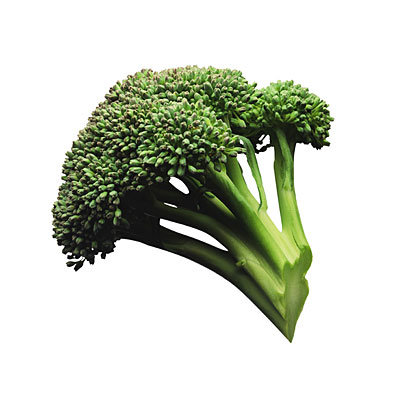
Broccoli
Calories: 31 per cup
Broccoli is amazingly low in calories, but it always makes our list of the top superfoods for a reason. Not only is it packed with fiber, vitamins, and minerals, it contains powerful antioxidants that may improve your odds of breast cancer survival and reduce the risk of colon cancer.
The chemical in broccoli responsible for the protective effect is called sulforaphane, and yes, it gives broccoli its slightly bitter flavor.
Try this recipe: Broccoli & Feta Omelet with Toast
View as one page
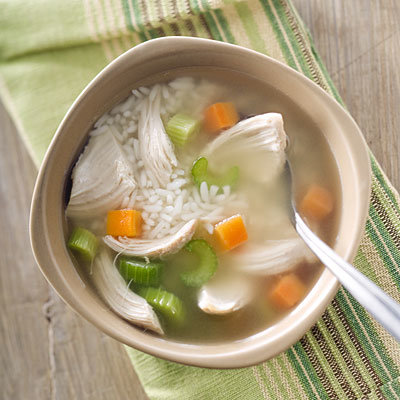
Broth
Calories: 10 per cup
Clear beef, chicken, miso, seafood, or vegetable broth is a dieter’s secret weapon, nourishing and filling your body for almost zero calories, especially if you toss in leafy greens and lean meat. Broth is the ultimate “high volume food,” meaning you can eat large amounts for very few calories and still feel full. It all comes down to calories per bite, or in this case, slurp.
"By choosing foods that have fewer calories per bite, your portion size grows, but your overall calorie count decreases," explains Barbara Rolls, PhD, the creator of Volumetrics and author of the new book The Ultimate Volumetrics Diet. "So you end up with a satisfying amount of food."
The bad: This food is very high in Sodium. Read More
Try this recipe: Light French Onion Soup
View as one page
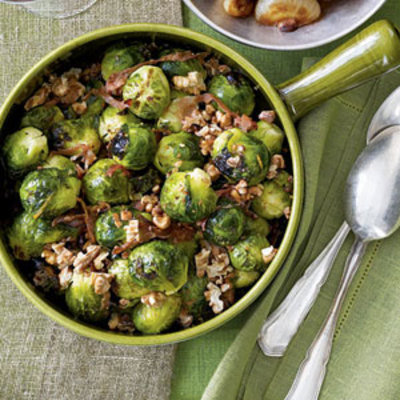
Brussel sprouts
Calories: 38 per cup
Brussels sprouts are super-low in calories but loaded with cancer-preventing phytonutrients and fiber. These veggies, sometimes called little cabbages, get a bad rap, but they taste great with a sweet or tangy sauce.
Try this recipe: Chicken Breast With Shaved Brussels Sprouts
View as one page
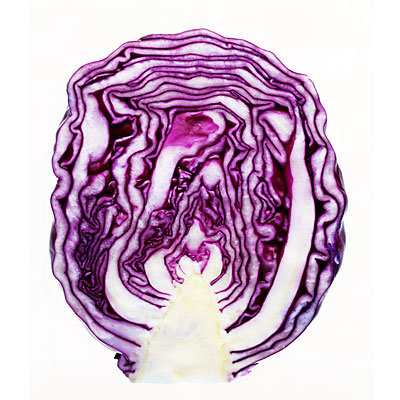
Cabbage
Calories: 22 per cup
Crunchy, sweet, and affordable! How can a food that is so humble, with so few calories, be so incredibly good for you? Cabbage packs vitamins, minerals, fibers, and several phytonutrients thought to prevent cancer. Glucosinolate is a metabolic detoxifier and sulphoraphane is a powerful anti-carcinogenic.
Purple cabbage also contains anthocyanins and other natural chemicals that boost cellular repair and block cancer growth. Eat up!
Try this recipe: Sweet Cabbage Salad
View as one page
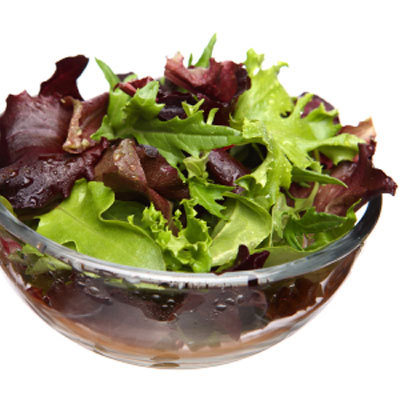
Lettuce
Calories: 5 per cup
You can literally eat pounds of any variety of lettuce and never gain an ounce. Romaine lettuce alone is a great source of B vitamins, folic acid, and manganese, which helps regulate blood sugar and is essential for proper immune system function.
Choose other dark green or purple varieties such as green or red leaf for the most nutrients, and toss with a zesty homemade vinaigrette.
Try this recipe: Indian Chicken Salad with Peanuts
Watch the video: How to Store Lettuce
View as one page
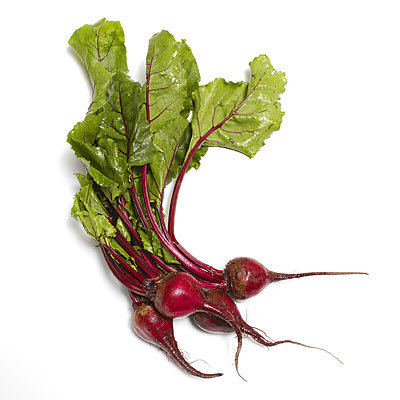
Beets
Calories: 37 per 1/2 cup
Beets are sweet but have very few calories—so you can have something sweet without the guilt. They also are rich in cancer-fighting antioxidants.
Beyond their rich, earthy deliciousness, beets are also a nutritional powerhouse. Rich in iron, fiber, folate, and potassium, they’re an excellent way to boost the nutrition in a salad or pasta dish. They get their gorgeous color from betanin, a potent antioxidant.
Try this recipe: Savory Beet Soup
View as one page
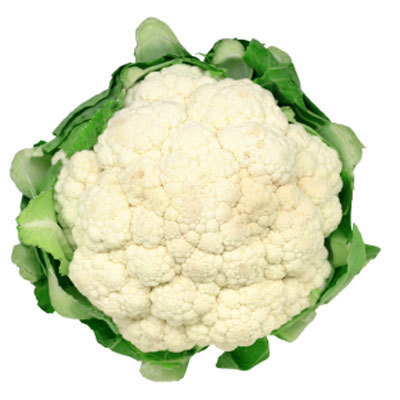
Cauliflower
Like other cruciferous veggies, cauliflower is full of cancer-fighting phytonutrients and is a great source of vitamin C and folate. Nibble on raw or lightly steamed florets to maximize cauliflower's nutritional power. Cauliflower is one of the top superfoods, that may improve your odds for breast cancer survival.
Try this recipe: Roasted Cauliflower With Olive Vinaigrette
View as one page
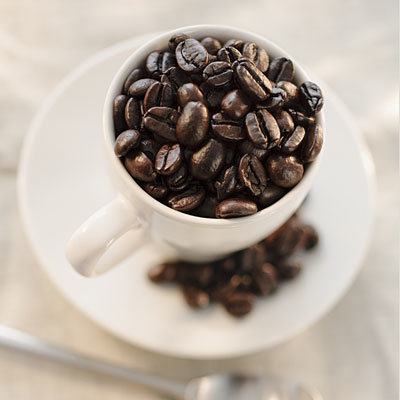
Coffee
Calories: zero
Black coffee is one of the lowest-calorie drink choices around, and it’s a great weight loss ally. Coffee alters levels of gut peptides, the hormones naturally released to control hunger or fullness.
Coffee drinkers may be at lower risk of liver and colon cancer, type 2 diabetes, and Parkinson’s disease, and it may help you live longer: A 2008 study found that women who drank coffee regularly—up to six cups a day—were less likely to die of various causes during the study than their non-coffee-drinking counterparts.
What’s more the caffeine in coffee can speed up metabolism and fat-burning, which helps lower your risk of type 2 diabetes and obesity.
Try this recipe: Ultra Iced Coffee
View as one page
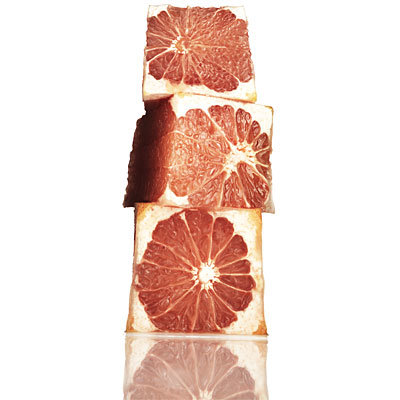
Grapefruit
Calories: 39 per half fruit
Remember The Grapefruit Diet? There may be something to that. Studies reveal that, on average, women who consumed any amount of grapefruit or grapefruit juice weighed nearly 10 pounds less and had a 6 percent lower body mass index (BMI) than their non-grapefruit-eating counterparts.
A powerhouse for heart health, grapefruit contains vitamin C, folic acid, and potassium, along with pectin, a soluble fiber that may be a strong ally against atherosclerosis. Pink and red varieties also have vitamin A and lycopene, a phytochemical that protects arterial walls from oxidative damage.
Try this recipe: Grapefruit and Avocado Salad With Seared Salmon
View as one page
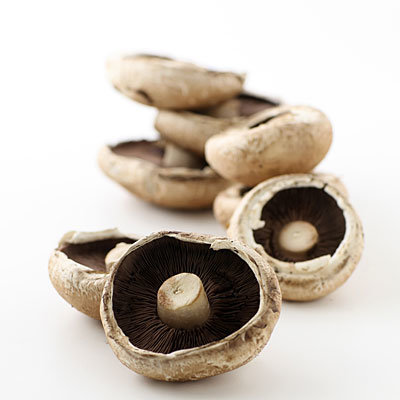
Mushrooms
Calories: 15 per cup
Meaty and incredibly low-cal, mushrooms are also incredibly diverse. White button, Portobello, shiitake, and Maitake are just a few of the varieties you'll find in your grocery store. Fortunately, just about all mushrooms contain some form of immune-boosting antioxidants, along with potassium, B vitamins, and fiber.
Shiitakes, for example, contain lentinan, a nutrient that is thought to have anticancer properties. All mushrooms are good sources of vitamin D, thiamin, riboflavin, niacin, vitamin B6, pantothenic acid, phosphorus, potassium, copper and selenium.
Try this recipe: Vegetarian Stuffed Mushrooms
View as one page
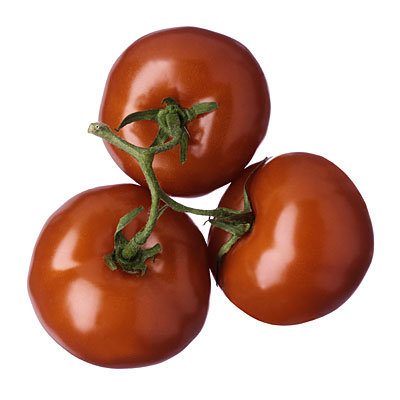
Tomatoes
Calories: 22 per medium tomato
They contain lycopene, an antioxidant rarely found in other foods. Studies suggest that it could protect the skin against harmful UV rays, prevent certain cancers, and lower cholesterol. Plus, tomatoes contain high amounts of potassium, fiber, and vitamin C.
View as one page
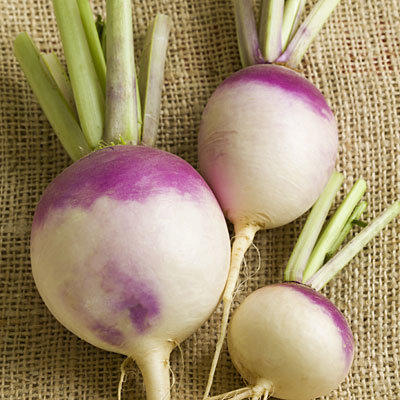
Turnips
Calories: 36 per cup
The potatoes skinnier cousin, turnips are a great source of fiber and vitamin C, and have a low glycemic load. We love them diced and tossed into soups or stews, or sliced raw and used in crudite (they taste surprisingly mild and crunchy!).
Try this recipe: North African-Spiced Vegetable Tagine
View as one page
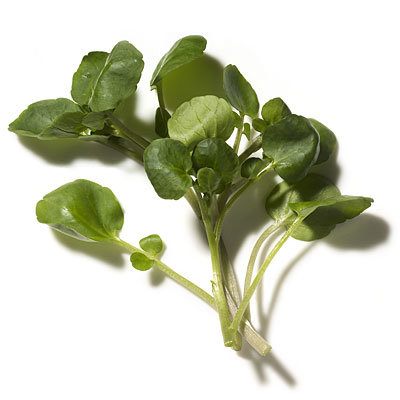
Watercress
Calories: 4 per cup
A cleansing cruceriferous vegetable with the fresh crunch of salad greens and the powerful cancer-fighting properties of Brussels sprouts and broccoli, watercress contain sulforaphane and other compounds linked to lower disease risks. Studies suggest that people who regularly eat these vegetables might also be protected from lung cancer.
Try this recipe: Watercress Soup with Toasted Almonds
View as one page
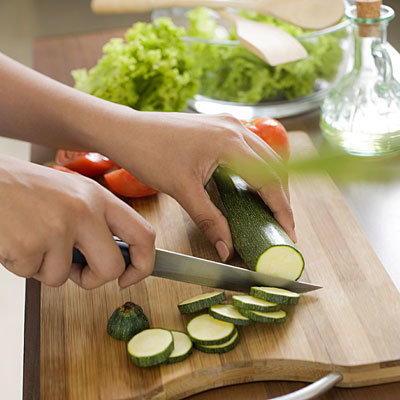
Zucchini
Calories: 20 per cup
This miracle squash is the ultimate high volume food, meaning you can fill up on very few calories. It’s easy to grow, especially in the summer, packs lots of vitamin A, and is so simple to prepare raw or cook with you may want to eat it all year!
Try this recipe: Crunchy Zucchini Rounds With Sun-Dried Tomatoes and Goat Cheese
View as one page
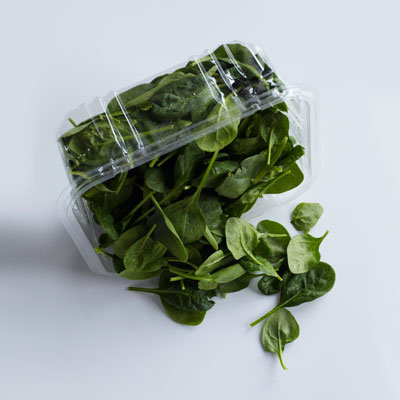
Spinach
Calories: 7 per cup
Tender and flavorful, this leafy green is rich in iron, folic acid, and vitamin K. It also contains disease-fighting antioxidants beta-carotene and vitamin C, as well as the phytochemical lutein, which protects eyes against age-related macular degeneration.
Use as a substitute for lettuce in salad or lightly sauté with shredded carrot, sliced mushrooms, and garlic for a savory omelet filling.
Try this recipe: Sweet Potato and Spinach Quesadillas
View as one page
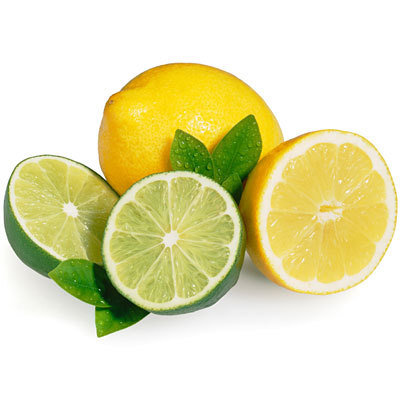
Lemons and limes
Calories: 20 per fruit (without peel)
Citrus fruits are loaded with vitamin C and, eaten whole, are a great source of fiber. Studies show that loading up on C-rich citrus at the first sign of illness may reduce a cold's duration by about a day. We also love adding a splash of lemon or lime juice to recipes.
Often tart and sometimes sweet citrus flavors add a punch of flavor without any added fat, calories, or cholesterol.
Try this recipe: Lemon-Olive Grilled Chicken
View as one page
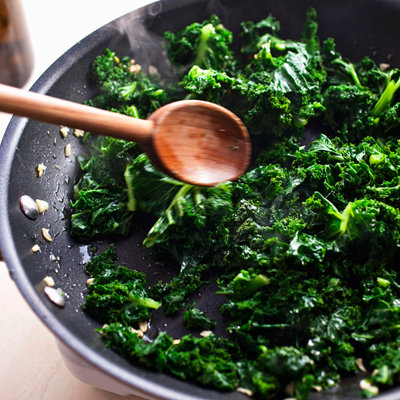
Kale
Calories: 5 per cup
Kale is possibly the healthiest superfood around, packing a widevariety of phytonutrients that may prevent cancer, including breast cancer. (Scientsits theorize that the phytonutrients in kale trigger the liver to produce enzymes that neutralize potentially cancer-causing substances.)
Kale is also a great source of B vitamins, folic acid, and manganese, which helps regulate blood sugar and is essential for proper immune system function.
Watch the video: Fat-Burning Recipe: Kale, Grapefruit, and Hazelnut Salad
Try this recipe: Crispy Tamari Kale Chips
View as one page
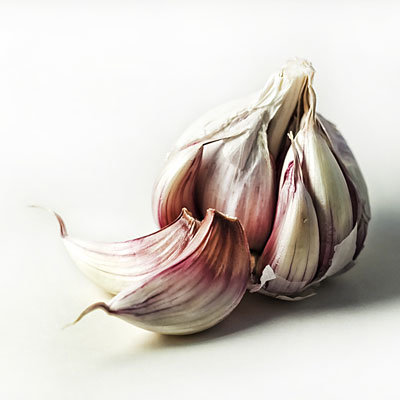
Garlic
Calories: 4 per clove
Garlic fights colds, battles cancer, and may even ward off urinary tract infections. A diet rich in garlic can help thanks to the bulb’s natural antimicrobial properties.
To get the most health benefits out of this stinky bulb, let chopped or crushed garlic sit for 10 minutes before heating. This method helps it retain a third more of its cancer-fighting sulfur compounds than if it were cooked immediately.
Try this recipe: Garlic & Herb Yogurt Dip
View as one page
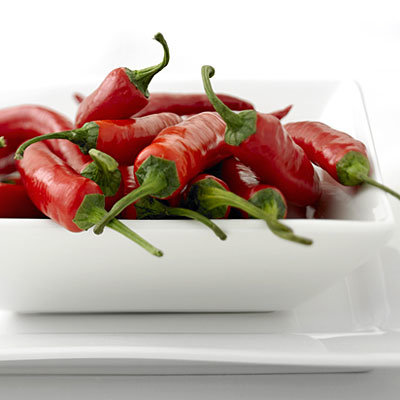
Peppers
Calories: 30 per half cup
Hot or mild, peppers are packed with vitamin C fiber for negligible calories. The heat in hot peppers signals the presence of capsaicin, a compound that, along with capsiate, can propel the body to scorch an extra 50 to 100 calories following a spicy meal.
Go for: Chilies as hot as you can stand. (But watch out! The hottest ones—habanero, Scotch bonnet, and Thai or Indian peppers—are too fiery for many people.)
Try this recipe: Stuffed Roasted Red Peppers
View as one page
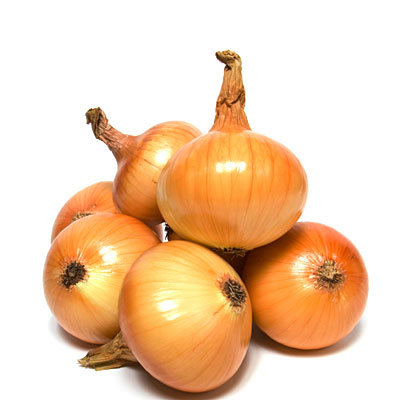
Onions
Calories: 32 per half cup
Don’t hold the onions! These flavorful bulbs, which range from sweet to sharp in flavor, boast allyl sulfides, compounds that have been shown to protect against endometrial cancer in laboratory studies.
Try this recipe: Bistro-Style French Onion Soup
View as one page

Pumpkin
Calories: 30 per cup
This low-calorie squash is rich in potassium and loaded with beta-carotene (a powerful antioxidant), and its natural sweetness brings flavor to baked goods without any added guilt. It’s a great source of vitamins A, C, and E, and packs potassium (great for lowering blood pressure) and copper.
Eating pumpkin may even be good for diabetes; studies found two compounds in this vegetable, trigonelline and nicotinic acid, improved glucose tolerance in rats.
Try this recipe: Chocolate Chip Pumpkin Bread
View as one page
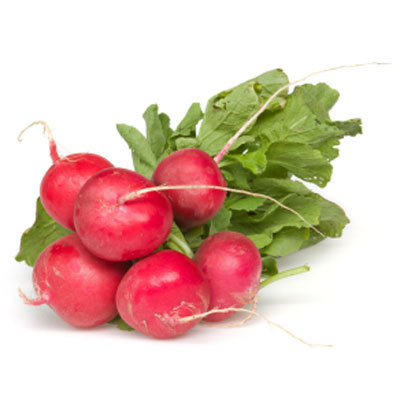
Radishes
Calories: 19 per cup
These brightly colored vegetables are packed with potassium, folic acid, antioxidants, and sulfur compounds that aid in digestion.
Don't forget the leafy green tops, which contain six times the vitamin C and more calcium than the roots. Thinly slice and toss in a fresh green salad or julienne for coleslaw.
Try this recipe: Cucumber-and-Radish Stir-Fry with Rice Noodles
View as one page
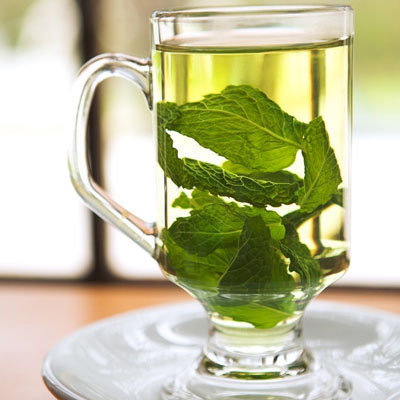
Tea
Calories: 0
When we talk about tea as a superfood, we mean black, green, white, or oolong (herb teas are infusions of other plants with different nutritional characteristics).
All “real” teas are high in polyphenols, an antioxidant that protects cells from the DNA damage that can cause cancer and other diseases. Tea may also lower LDL or bad cholesterol, ward off osteoporosis, boost your brain power, and keep you thin.
We’ll drink to that!
Try this recipe: Spiced Green Tea Smoothie
View as one page
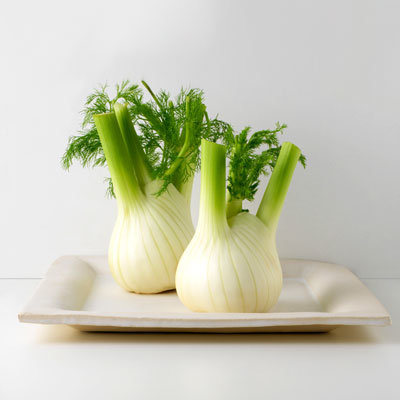
Fennel
Calories: 27 per cup
This incredibly crunchy, delicious, licorice-flavored veggie freshens your breath, soothes winter coughs, and even flattens your belly. It is also a good source of fiber and contains several vitamins and minerals. We love it raw!
Try this recipe: Scallops in Parchment with Fennel, Tomatoes, and Olives
View as one page
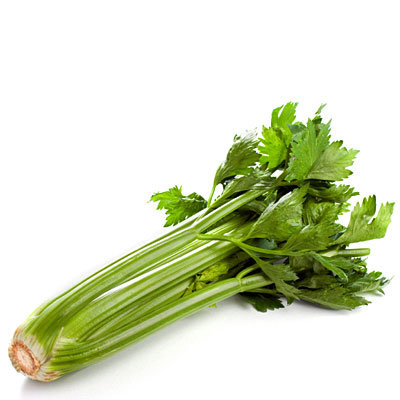
Celery
Calories: 16 per cup
Crunchy, a little salty, packed with fiber and an incredibly high-volume food (meaning you can eat a lot for a few calories), celery is a chef’s secret weapon. For almost zero calories it also contains vitamin A, vitamin C, and folate, crucial for a healthy pregnancy.
Try this recipe: Apple-and-Celery Root Salad
View as one page
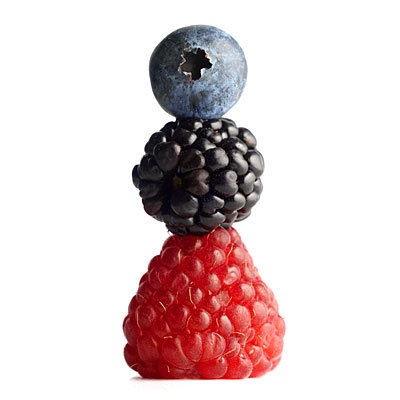
Berries
Calories: 32 per 1/2 cup
Blueberries, raspberries, strawberries—whatever berry you like best—are full of anti-inflammatories, which reduce your risk of heart disease and cancer.
These antioxidant powerhouses are bite-sized immunity boosters, especially when they grow in the wild. In 2007, Cornell University scientists found that wild blueberries contained the most active antioxidants of any fresh fruit, thanks to their high levels of anthocyanins—one of the most potent antioxidants.
Try this recipe: A Berry-Good Smoothie
View as one page
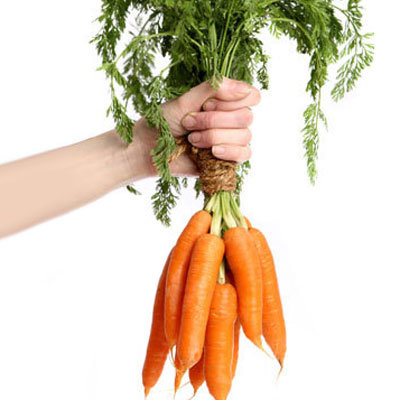
Carrots
Calories: 22 per 1/2 cup
Carrots are very low in saturated fat and cholesterol. It is also a good source of thiamin, niacin, vitamin B6, folate and manganese, and a very good source of dietary fiber, vitamin A, vitamin C, vitamin K, and potassium.
Try this recipe: Carrot-Ginger Soup
-
Best Weight Loss Plan
Recent media release suggested that parents are to be held responsible
-
How to Make Your Own Abs Diet Recipes
If you are overweight or you really care about maintaining your wei
-
Vegetarian Fat Loss Tips
Do you still remember your vegetarian fa
-
Research On Hcg Weight Loss Drops
You are overweight and what are you really looking for? A good body a
-
Tips on Easiest Way to Lose Weight
Losing your weight is not a simple task. There are many people who
-
A Quick Introduction to Coolsculpting
According to various definitions, CoolSculpting is the only FDA-cleare
- DON'T MISS
- Maqui Superberry is Sometimes Misspelled as Maqui Super Berry
- Record Your Meals To Lose Weight
- Can You Force Someone to Be Healthier?
- What Everyone Should Know About How To Lose Weight
- Permanent Fat Loss Secrets: Weight Loss Motivation Tips (Holiday Season Weight Loss Survival Plan)
- Liposuction is not a slimming surgery
- Useful Diets to Reduce Cholesterol
- Quickest Way To Lose Weight / No Diet Pills
- Your Health and Your Weight
- Double Chin Exercise




